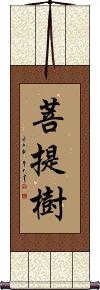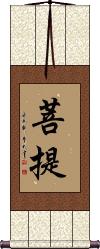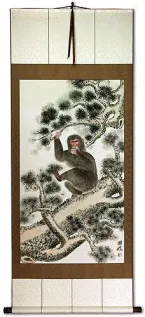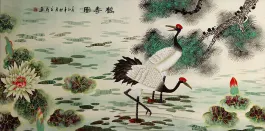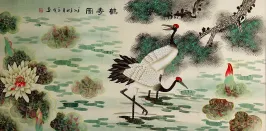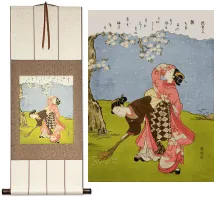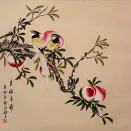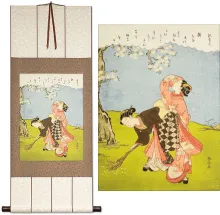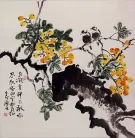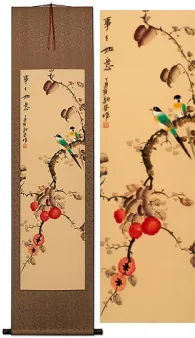Many custom options...
And formats...

Bodhi Tree in Chinese / Japanese...
Buy a Bodhi Tree calligraphy wall scroll here!
Personalize your custom “Bodhi Tree” project by clicking the button next to your favorite “Bodhi Tree” title below...
The Tree of Enlightenment / The Bodhi Tree
菩提樹 is the full title of the Bodhi tree (a fig tree) under which Siddhartha Gautama (the legendary man who established the Buddhist religion), achieved enlightenment.
Sometimes this is referred to as “the tree of enlightenment.” If you don't have a Bodhi tree to sit under, maybe you can achieve enlightenment under a wall scroll with this title.
Bodhi - Awakening Enlightenment
The Bodhi or 菩提 is the moment of completion in Buddhism.
It is when all things become known and you have completed your journey to enlightenment.
The reference is to the Bodhi tree where Siddhartha Gautama (the legendary man who established the Buddhist religion) achieved enlightenment. Sometimes this is referred to as “the tree of enlightenment,” but if you want the full version with the character for a tree at the end, please see the Bodhi Tree entry.
See Also: Buddhism | Buddha | Nirvana | Enlightenment
This in-stock artwork might be what you are looking for, and ships right away...
Gallery Price: $268.00
Your Price: $148.88
Gallery Price: $178.00
Your Price: $98.88
Gallery Price: $340.00
Your Price: $188.88
Gallery Price: $340.00
Your Price: $188.88
Gallery Price: $178.00
Your Price: $98.88
Gallery Price: $200.00
Your Price: $69.88
Gallery Price: $108.00
Your Price: $59.88
Gallery Price: $200.00
Your Price: $69.88
Gallery Price: $115.00
Your Price: $63.88
Gallery Price: $268.00
Your Price: $148.88
Gallery Price: $108.00
Your Price: $59.88
Gallery Price: $126.00
Your Price: $69.88
Gallery Price: $126.00
Your Price: $69.88
Not the results for bodhi tree that you were looking for?
Below are some entries from our dictionary that may match your bodhi tree search...
| Characters If shown, 2nd row is Simp. Chinese |
Pronunciation Romanization |
Simple Dictionary Definition |
佛 see styles |
fú fu2 fu hotoke ほとけ |
More info & calligraphy: Buddhism / Buddha(surname) Hotoke Buddha, from budh to "be aware of", "conceive", "observe", "wake"; also 佛陀; 浮圖; 浮陀; 浮頭; 浮塔; 勃陀; 勃馱; 沒馱; 母馱; 母陀; 部陀; 休屠. Buddha means "completely conscious, enlightened", and came to mean the enlightener. he Chinese translation is 覺 to perceive, aware, awake; and 智 gnosis, knowledge. There is an Eternal Buddha, see e.g. the Lotus Sutra, cap. 16, and multitudes of Buddhas, but the personality of a Supreme Buddha, an Ādi-Buddha, is not defined. Buddha is in and through all things, and some schools are definitely Pan-Buddhist in the pantheistic sense. In the triratna 三寳 commonly known as 三寳佛, while Śākyamuni Buddha is the first "person" of the Trinity, his Law the second, and the Order the third, all three by some are accounted as manifestations of the All-Buddha. As Śākyamuni, the title indicates him as the last of the line of Buddhas who have appeared in this world, Maitreya is to be the next. As such he is the one who has achieved enlightenment, having discovered the essential evil of existence (some say mundane existence, others all existence), and the way of deliverance from the constant round of reincarnations; this way is through the moral life into nirvana, by means of self-abnegation, the monastic life, and meditation. By this method a Buddha, or enlightened one, himself obtains Supreme Enlightenment, or Omniscience, and according to Māhāyanism leads all beings into the same enlightenment. He sees things not as they seem in their phenomenal but in their noumenal aspects, as they really are. The term is also applied to those who understand the chain of causality (twelve nidānas) and have attained enlightenment surpassing that of the arhat. Four types of the Buddha are referred to: (1) 三藏佛the Buddha of the Tripiṭaka who attained enlightenment on the bare ground under the bodhi-tree; (2) 通佛the Buddha on the deva robe under the bodhi-tree of the seven precious things; (3) 別佛the Buddha on the great precious Lotus throne under the Lotus realm bodhi-tree; and (4) 圓佛the Buddha on the throne of Space in the realm of eternal rest and glory where he is Vairocana. The Hīnayāna only admits the existence of one Buddha at a time; Mahāyāna claims the existence of many Buddhas at one and the same time, as many Buddhas as there are Buddha-universes, which are infinite in number. |
道場 道场 see styles |
dào chǎng dao4 chang3 tao ch`ang tao chang michiba みちば |
More info & calligraphy: Dojo / Martial Arts Studio(1) dojo; hall used for martial arts training; (2) (abbreviation) {Buddh} (See 菩提道場) manda (place of Buddhist practice or meditation, esp. the place under the bodhi tree where Buddha attained enlightenment); (surname) Michiba Truth-plot. bodhimaṇḍala, circle, or place of enlightenment. The place where Buddha attained enlightenment. A place, or method, for attaining to Buddha-truth. An object of or place for religious offerings. A place for teaching, learning, or practising religion. |
菩提樹 菩提树 see styles |
pú tí shù pu2 ti2 shu4 p`u t`i shu pu ti shu bodaiju ぼだいじゅ |
More info & calligraphy: The Tree of Enlightenment / The Bodhi Tree(1) Tilia miqueliana (species of linden tree); (2) (See インドボダイジュ) sacred fig (Ficus religiosa); bodhi tree; bo tree; peepal tree; pipal tree; (given name) Bodaiju bodhidruma, bodhitaru, bodhivṛkṣa; the wisdom-tree, i.e. that under which Śākyamuni attained his enlightenment, and became Buddha. The Ficus religiosa is the pippala, or aśvattha, wrongly identified by Faxian as the palm-tree; it is described as an evergreen, to have been 400 feet high, been cut down several times, but in the Tang dynasty still to be 40 or 50 feet high. A branch of it is said to have been sent by Aśoka to Ceylon, from which sprang the celebrated Bo-tree still flourishing there. |
人樹 人树 see styles |
rén shù ren2 shu4 jen shu ninju |
The Tree among men, giving shelter as the bodhi-tree, a Buddha. |
佛樹 佛树 see styles |
fó shù fo2 shu4 fo shu butsuju |
bodhidruma; 道樹 the Bodhi-tree under which Śākyamuni obtained enlightenment or became Buddha, Ficus religiosa. |
成道 see styles |
chéng dào cheng2 dao4 ch`eng tao cheng tao narumichi なるみち |
to reach illumination (Buddhism) (n,vs,vi) completing the path to becoming a Buddha (by attaining enlightenment); (personal name) Narumichi To attain the Way, or become enlightened, e.g. the Buddha under the bodhi tree. |
提樹 提树 see styles |
tí shù ti2 shu4 t`i shu ti shu teiju / teju ていじゅ |
(given name) Teiju The bodhidruma tree, v. 菩. |
舍摩 see styles |
shè mó she4 mo2 she mo shama |
śama, calm, quiet, a name for the bodhi tree. For舍摩陀 v. 奢. |
藏教 see styles |
zàng jiào zang4 jiao4 tsang chiao zōkyō |
The Piṭaka, i.e. Tripiṭaka school, one of the four divisions 藏通別圓 as classified by Tiantai; it is the Hīnayāna school of the śrāvaka and pratyeka-buddha type, based on the tripiṭaka and its four dogmas, with the bodhisattva doctrine as an unimportant side issue. It is also subdivided into four others, 有 the reality of things, 空 their unreality, both and neither. The bodhisattva of the Piṭaka school is defined as undergoing seven stages, beginning with the four dogmas and ending with complete enlightenment under the bodhi-tree. |
覺樹 觉树 see styles |
jué shù jue2 shu4 chüeh shu kakuju |
The tree of knowledge, or enlightenment, the pippala under which the Buddha attained enlightenment, also called bodhidruma and ficus religiosa. To plant virtue in order to attain enlightenment. |
道樹 道树 see styles |
dào shù dao4 shu4 tao shu michiki みちき |
(given name) Michiki The bodhi-tree, under which Buddha attained enlightenment; also as a synonym of Buddhism with its powers of growth and fruitfulness. |
人中樹 人中树 see styles |
rén zhōng shù ren2 zhong1 shu4 jen chung shu ninchūju |
The Tree among men, giving shelter as the bodhi-tree, a Buddha. |
元吉樹 元吉树 see styles |
yuán jí shù yuan2 ji2 shu4 yüan chi shu gankitsuju |
The tree of the origin of felicity, i. e. the bodhi-tree or ficus religiosa, also styled 佛樹; 道樹, and 菩提樹. |
活兒子 活儿子 see styles |
huó ér zǐ huo2 er2 zi3 huo erh tzu katsu nishi |
A name for the bodhi-tree. |
菩提場 菩提场 see styles |
pú tí chǎng pu2 ti2 chang3 p`u t`i ch`ang pu ti chang bodai jō |
A place, plot, or site of enlightenment, especially Śākyamuni's under the bodhi-tree. |
菩提子 see styles |
pú tí zǐ pu2 ti2 zi3 p`u t`i tzu pu ti tzu bodaishi ぼだいし |
(given name) Bodaishi bodhi-seeds, or beads, the hard seeds of a kind of Himalayan grass, also of a tree at Tiantai, used for rosaries. |
阿說他 阿说他 see styles |
ā shuō tā a1 shuo1 ta1 a shuo t`a a shuo ta asetsuta |
aśvattha, a tree, the ficus religiosa, or bodhi-tree, called also the 無罪樹 no-sin tree, because whoever goes around it three times is rid of sin. Also 阿濕波他; 阿舍波陀; 阿輸他. |
龍華樹 龙华树 see styles |
lóng huā shù long2 hua1 shu4 lung hua shu |
nāga-puṣpa; 奔那伽 puṣpanāga, the dragon-flower tree, which will be the bodhi-tree of Maitreya, the Buddhist Messiah, when he comes to earth. |
三佛菩提 see styles |
sān fó pú tí san1 fo2 pu2 ti2 san fo p`u t`i san fo pu ti san butsu bodai |
The bodhi, or wisdom, of each of the Trikāya, 三身, i.e. that under the bodhi tree, that of parinirvāṇa, that of tathāgatagarbha in its eternal nirvāṇa aspect. |
五類說法 五类说法 see styles |
wǔ lèi shuō fǎ wu3 lei4 shuo1 fa3 wu lei shuo fa gorui sepphō |
The five preachers in the Huayan sutra: the Buddha; bodhisattvas; śrāvakas; the devas in their praise songs; and material things, e. g. the bodhi-tree; v. 五種說人. |
千百億身 千百亿身 see styles |
qiān bǎi yì shēn qian1 bai3 yi4 shen1 ch`ien pai i shen chien pai i shen senhyakuoku shin |
The Buddha Locana seated on a lotus of a thousand petals, each containing myriads of worlds in each world is, Śākyamuni seated under a bodhi tree, all such worlds attaining bodhi at the same instant. |
菩提樹下 菩提树下 see styles |
pú tí shù xià pu2 ti2 shu4 xia4 p`u t`i shu hsia pu ti shu hsia bodai ju ge |
beneath the bodhi tree |
菩提道場 菩提道场 see styles |
pú tí dào chǎng pu2 ti2 dao4 chang3 p`u t`i tao ch`ang pu ti tao chang bodaidoujou / bodaidojo ぼだいどうじょう |
Bodhimanda (place of enlightenment associated with a Bodhisattva) {Buddh} Bodhi-manda (place of Buddhist practice or meditation, esp. the place under the bodhi tree where Buddha attained enlightenment) bodhimaṇḍa, the bodhi-site, or plot or seat which raised itself where Śākyamuni attained Buddhahood. It is said to be diamond-like, the navel or centre of the earth; every bodhisattva sits down on such a seat before becoming Buddha. |
印度菩提樹 see styles |
indobodaiju; indobodaiju いんどぼだいじゅ; インドボダイジュ |
(kana only) sacred fig (Ficus religiosa); peepul; bo-tree; bodhi tree; pippala tree; ashwattha tree |
屈屈吒播陀 屈屈咤播陀 see styles |
qū qū zhà bò tuó qu1 qu1 zha4 bo4 tuo2 ch`ü ch`ü cha po t`o chü chü cha po to Kukutahada |
(or屈屈吒波陀) Kukkuṭapādagiri; Cock's foot, a mountain said to be 100 li east of the bodhi tree, and, by Eitel, 7 miles south-east of Gayā, where Kāśyapa entered into nirvāṇa; also known as 窶盧播陀山 tr. by 尊足 'honoured foot'. The legend is that these three sharply rising peaks, on Kāśyapa entering, closed together over him. Later, when Mañjuśrī ascended, he snapped his fingers, the peaks opened, Kāśyapa gave him his robe and entered nirvāṇa by fire. 屈叱阿濫摩 Kukkuṭa-ārāma, a monastery built on the above mountain by Aśoka, cf. 西域記 8. |
インドボダイジュ see styles |
indobodaiju インドボダイジュ |
(kana only) sacred fig (Ficus religiosa); peepul; bo-tree; bodhi tree; pippala tree; ashwattha tree |
Variations: |
indobodaiju; indobodaiju インドぼだいじゅ; インドボダイジュ |
(kana only) sacred fig (Ficus religiosa); bodhi tree; bo tree; peepal tree; pipal tree |
釋迦牟尼佛成道在菩提樹降魔讚 释迦牟尼佛成道在菩提树降魔讚 see styles |
shì jiā mù ní fó chéng dào zài pú tí shù jiàng mó zàn shi4 jia1 mu4 ni2 fo2 cheng2 dao4 zai4 pu2 ti2 shu4 jiang4 mo2 zan4 shih chia mu ni fo ch`eng tao tsai p`u t`i shu chiang mo tsan shih chia mu ni fo cheng tao tsai pu ti shu chiang mo tsan Shakamuni butsujōdō zai bodaiju gōma san |
Hymn to Śakyamūṇi's Path to Buddhahood Under the Bodhi Tree, and His Triumph over Māra |
The following table may be helpful for those studying Chinese or Japanese...
| Title | Characters | Romaji (Romanized Japanese) | Various forms of Romanized Chinese | |
| The Tree of Enlightenment The Bodhi Tree | 菩提樹 菩提树 | bodaiju | pú tí shù pu2 ti2 shu4 pu ti shu putishu | p`u t`i shu putishu pu ti shu |
| Bodhi - Awakening Enlightenment | 菩提 | bodai | pú tí / pu2 ti2 / pu ti / puti | p`u t`i / puti / pu ti |
| In some entries above you will see that characters have different versions above and below a line. In these cases, the characters above the line are Traditional Chinese, while the ones below are Simplified Chinese. | ||||
Successful Chinese Character and Japanese Kanji calligraphy searches within the last few hours...
